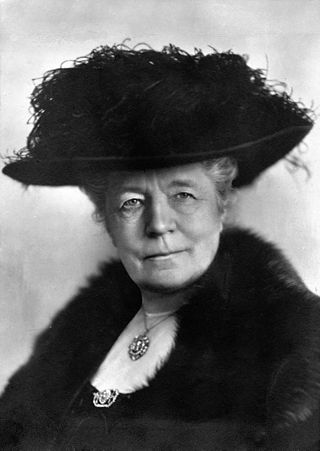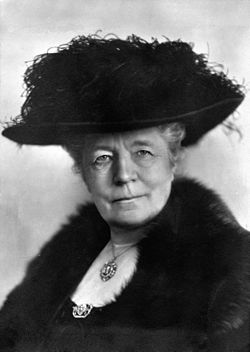Top Qs
Timeline
Chat
Perspective
1909 Nobel Prize in Literature
Award From Wikipedia, the free encyclopedia
Remove ads
The 1909 Nobel Prize in Literature was awarded to the Swedish author Selma Lagerlöf (1858–1940) "in appreciation of the lofty idealism, vivid imagination and spiritual perception that characterize her writings."[2] She became the first woman and first Swede to be awarded the prize.
Remove ads
Laureate

Selma Lagerlöf's authorship is deeply rooted in folk tales, legends, and stories from her home district in Värmland County, Sweden. Her début novel, Gösta Berling's Saga (1891), broke away from the then-prevailing realism and naturalism and is characterized by a vivid imagination. Even so, her works provide realistic depictions of people's circumstances, ideas, and social lives during the 19th-century religious revival. Lagerlöf wrote in prose and her stories characterized by a captivating descriptive power and their language by purity and clarity.[3] Among her significant novels include Jerusalem (1901–02), Nils Holgerssons underbara resa genom Sverige ("The Wonderful Adventures of Nil", 1907), Körkarlen ("Thy Soul Shall Bear Witness!", 1912), and The Ring of the Löwenskölds (1925–28).[4]
In 1914, Lagerlöf became a member of the Swedish Academy, the first woman to be so honored.[5] She nominated Georg Brandes for the 1920 and 1922 Nobel prize.[6]
Remove ads
Deliberations
Summarize
Perspective
Nominations
Selma Lagerlöf received 28 nominations since 1904. Her highest number of nominations (11 nominations) were for the 1909 prize with which she was awarded eventually.[6] In total, the Nobel committee received 38 nominations for 21 writers including Angelo de Gubernatis, Maurice Maeterlinck (awarded in 1911), Iwan Gilkin, and Jaroslav Vrchlický. Seven of the nominees were nominated for the first time including Ernest Lavisse, Verner von Heidenstam (awarded in 1916), Martin Greif, and Émile Verhaeren.[7]
The authors Gustaf af Geijerstam, Innokenty Annensky, Jakub Bart-Ćišinski, Rosa Nouchette Carey, Euclides da Cunha, John Davidson, Amalia Domingo Soler, George Manville Fenn, Clyde Fitch, Jacob Gordin, Sarah Orne Jewett, Cesare Lombroso, Luis Alfredo Martínez, Clorinda Matto de Turner, Catulle Mendès, Alfredo Oriani, Signe Rink, John Millington Synge, Renée Vivien, Rudolf von Gottschall, Detlev von Liliencron, Ernst von Wildenbruch, and Egerton Ryerson Young died in 1909 without having been nominated for the prize.
Prize decision
In 1909, Selma Lagerlöf was shortlisted alongside Maurice Maeterlinck and Émile Verhaeren.[citation needed] Committee chair Carl David af Wirsén yet again, knowing that Swinburne died months before the Nobel announcement, launched for Belgian writers Maeterlinck and Verhaeren.[citation needed] He regarded on Maeterlinck as "one of the finest writers in the continent" and praised his "brilliant compositions in works like The Blind and Pelléas and Mélisande, as was the same for Verhaeren's poetic oeuvres.[citation needed] But unfortunately, Wirsén failed to gain any support from other committee members. Hence, Lagerlöf was made the Nobel laureate.[8][page needed]
Remove ads
Reactions
The choice of Swedish writer Selma Lagerlöf as Nobel laureate in 1909 (for the "lofty idealism, vivid imagination and spiritual perception that characterizes her writings") followed fierce debate because of her writing style and subject matter, which broke literary decorums of the time.[9][10][11] In the French newspaper Le Figaro the award to Lagerlöf was enthusiastically received. "All of her work", reporter Marc Hélys wrote, "bears the mark of her nobel soul; all of it, all the way to the shortest of her stories, all the way to the delicious volume composed for children: The Wonderful Adventures of Nils". The positive recognition was complemented by a short story by Lagerlöf published in the paper's Supplément littéraire the same day.[12]
Award ceremony
Summarize
Perspective
In his award ceremony speech on 10 December 1909, Claes Annerstedt of the Swedish Academy said:
"Geijer, Tegnér, or Runeberg, to mention only them, could justly have laid claim to the Nobel Prize, and the development which these great men have started has grown to fuller bloom. But among the writers of the younger generation who have contributed so much to our literature, there is one name that enjoys the special splendour of a star of the first magnitude. In the works of Selma Lagerlöf we seem to recognize the purest and best features of our Great Swedish Mother."[13]
During Lagerlöf's acceptance speech, she remained humble and told a fantastic story of her father, as she 'visited him in heaven'. In the story, she asks her father for help with the debt she owes and her father explains the debt is from all the people who supported her throughout her career.[14][15] Lagerlöf explains that she remembered her father the moment she received the prize, saying:
"But then I thought of my father and felt a deep sorrow that he should no longer be alive, and that I could not go to him and tell him that I had been awarded the Nobel Prize. I knew that no one would have been happier than he to hear this. Never have I met anyone with his love and respect for the written word and its creators, and I wished that he could have known that the Swedish Academy had bestowed on me this great Prize. Yes, it was a deep sorrow to me that I could not tell him."[15]
Remove ads
Notes
- The nomination was made jointly by D. Patsopoulos and P. Karolidis.
- Wagner: Justice. Huit discours ("Justice: Eight Speeches", 1889), Sois un homme! Simples causeries sur la conduite de la vie ("Be a Man! Simple Discussions on How to Lead Life", 1889), Jeunesse ("Youth", 1895), Vie Simple ("Simple Life", 1895), L'âme des choses ("The Soul of Things", 1901), and Le long du chemin ("Along the Path", 1901)[1]
Remove ads
References
External links
Wikiwand - on
Seamless Wikipedia browsing. On steroids.
Remove ads

